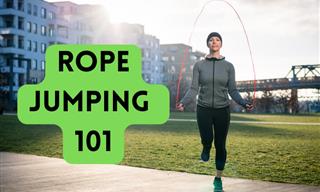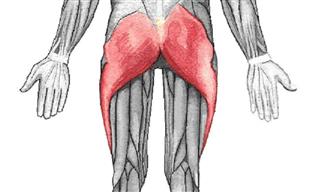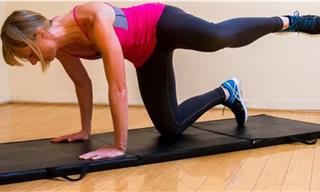Studies have shown that it’s common to experience back pain in your 40s and above. However, if you sit down a lot for work, back pain might occur earlier. Poor office furniture, bad posture, and carrying extra weight will only worsen the situation.
Can Exercising be Dangerous for Your Muscles?
Research has shown that it’s the act of not moving enough that’s harmful to your health. Living a motionless life is thought to speed up again. However, this doesn’t mean that you should adopt a professional athlete’s lifestyle. Even just 30 minutes of daily activity such as jogging or walking can benefit your heart and muscles.
To prevent possible injury, select a workout that suits your body type. Also, do some warm-up exercises before every training session.
5 Exercises to Strengthen Your Back
1. Bend forward at the waist, slightly bending your knees. Your hands should be down by your knees with some light weights in them. Slowly raise your hands until they’re parallel to the floor. Hold for a second and then move them back down to their starting position. Perform 10-15 reps.
2. Put your right knee and palm on a bench and hold a light weight in your left hand. Slowly move your left hand up, bending your elbow. When your fist touches your abdomen, hold if there for a few seconds. Slowly move your hand back to its starting position. Repeat this 10-15 times and then do the same with your right hand.
3. Bend down on your hands and knees. Raise your right arm and left leg until they’re parallel with the floor. Hold this for around 10 seconds, then do the same with your left arm and right leg.
4. Lie face down, and then slowly raise your head and upper chest. Keep your head in line with your spine. Hold for five seconds, then return to your original position. Perform 10-15 reps.
5. Lie face down, slowly raise your head and upper chest, and then stretch out your arms in front of your face. After 5-10 seconds, return to your original position. Perform 10-15 reps.
What Are Other First Signs of Aging?
Other common first signs of aging include hearing loss, vision troubles, high blood pressure, and memory issues. Your eyes might start giving you issues in your 40s. Hearing usually starts to decrease in your 60s. Blood pressure and memory problems usually occur no earlier than the age of 60-65.
These aging conditions are normal, but if you have chronic diseases such as diabetes, these problems can occur much earlier. If you start to experience any of these issues in your 30s, or the conditions are combined with other symptoms, you need to consult your doctor.
Though aging is normal and inevitable, there are some ways to slow down the process:
• Use vitamin E supplements to protect your cells from free radical damage.
• Do your utmost to stay active. This will help to keep your muscles, heart, and blood pressure in good condition.
• Stick to a healthy diet. Fruits, vegetables, whole grains, and fish will help you to manage your weight, fight stool problems, and provide you with plenty of energy.
• Take care of your skin. Use age-caring creams and apply sunscreen when out in the sun. Bathe in warm water instead of hot – this will help you to avoid wrinkles and dry skin.
• Regularly check your eyes, teeth, and ears with your doctor. Many age-related medical conditions can be cured if detected early enough.
Source: brightside
Images: depositphotos
 Go to BabaMail
Go to BabaMail


























